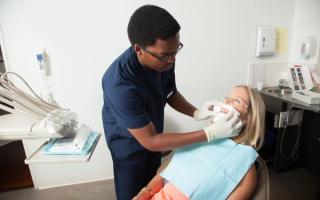Bruxism (teeth grinding)
Bruxism often occurs during a deep sleep or under stress.

Teeth Grinding is technically referred to as Bruxism. Sufferers of the condition experience involuntary clenching of the jaw or grinding of the teeth generally in their sleep but sometimes while they’re awake. It can be defined as mild, moderate or severe and the pain and tension caused by these actions has many flow on effects.

Signs and Symptoms of Bruxism:
- Grinding sounds while asleep
- Inconsistent and increased tooth wear
- Broken teeth or enamel
- Tooth and jaw sensitivity
- Clenching of the jaw
- Tight or clicking jaw and face pain
- Ear ache and headache
- Bitten inner cheeks and lips
- Wobbly teeth
What Causes Teeth Grinding?
Triggers vary from person to person, factors may include:
- Stress such as anxiety, anger or intense concentration
- Physical exertion, stress, illness, dehydration
- Illness, nutritional deficiency or dehydration
- Incorrect tooth alignment
- Elicit drug use particularly amphetamines
- Teething in children
How to Treat Bruxism (Teeth Grinding)?
If you think you may be grinding your teeth, or if your children are, see your oral health professional at Richmond Fine Dentistry for an assessment.
Treatment for mild cases may involve therapies to reduce stress or habits causing jaw clenching and grinding behavior. For more severe cases, x-rays may be required to ascertain the full extent of the problem and damage caused. Oral treatment devices such as splints, mouth guards, braces, or oral surgery may be required for more severe cases.
For a bruxism assessment contact our friendly staff at Richmond Fine Dentistry.


